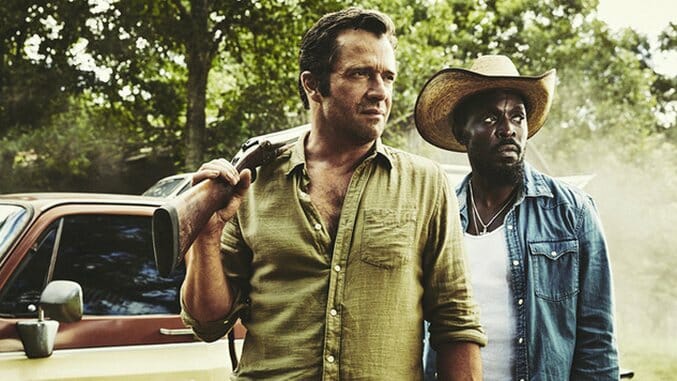Hap and Leonard: Author Joe R. Lansdale Discusses the New SundanceTV Series
Photo Courtesy of SundanceTV; Author Photo by Karen Lansdale
With his Hap and Leonard series, East Texas author Joe R. Lansdale has created one of the most indelible crime-solving duos since Holmes and Watson.
The series focuses on Hap Collins and Leonard Pine, an odd couple bonded by a deep, occasionally turbulent friendship and a knack for trouble. Hap is white, liberal, straight and a Vietnam War resister, while Leonard is black, conservative, gay and a war veteran. For decades, Hap and Leonard’s world has evolved through nine novels, as well as a handful of novellas and short stories.
The first Hap and Leonard book, Savage Season, was published in 1990 and “did nothing,” Lansdale says. “It got maybe four reviews and was forgotten. I didn’t think it was a series anyway.” Four years later, the follow-up Mucho Mojo was named a New York Times Notable Book of the Year, and the series has steadily gained readers ever since.
A flurry of Hap and Leonard activity is slated for 2016. Lansdale released a new book in the series, Honky Tonk Samurai, last month, and a short story collection hit shelves yesterday. His characters will also make their television debut tonight in Hap and Leonard, a new SundanceTV series starring James Purefoy as Hap and Michael K. Williams as Leonard.
Paste caught up with Lansdale at The Poisoned Pen Bookstore in Scottsdale, Arizona to discuss his characters’ transition from the page to the screen.

 Paste: How did you first come up with the characters of Hap and Leonard?
Paste: How did you first come up with the characters of Hap and Leonard?
Lansdale: When I sat down to write about them, it felt like they struck me out of the blue. But it actually was based on a lot of my life, the kind of jobs I did early on, my background growing up in the South during that era. It was an evaluation of the experiences I’d had in the ‘60s and early ‘70s and on, up until I wrote the book. I decided with Savage Season to use a lot of things in my life as the basis.
Obviously, the things that happened to these poor guys didn’t happen to me, but I used my background for a lot of Hap’s background. I grew up being poor, and I lived that kind of life. I was a bouncer, I worked in the rose fields, I teach martial arts and he’s a martial artist. Like Hap, I was a Vietnam War resister. I was drafted and refused to go and nearly went to prison.
Paste: Why write a duo instead of a single protagonist?
Lansdale: That’s funny, because I was going to write the novel just about Hap. And when I started writing, this guy Leonard showed up. I thought he was just a minor character and he was going to leave. He left, but he calls Hap on the phone and they just started talking. I thought that these guys talked fun together, so that’s how it happened. These guys chatter like squirrels, just like I do. Leonard is based on a lot of people, but he’s also that doppelgänger side to an extent. The whole series is just an accident; them being together is an accident.
-

-

-

-

-

-

-

-

-

-

-

-

-

-

-

-

-

-

-

-

-

-

-

-

-

-

-

-

-

-

-

-

-

-

-

-

-

-

-

-








































